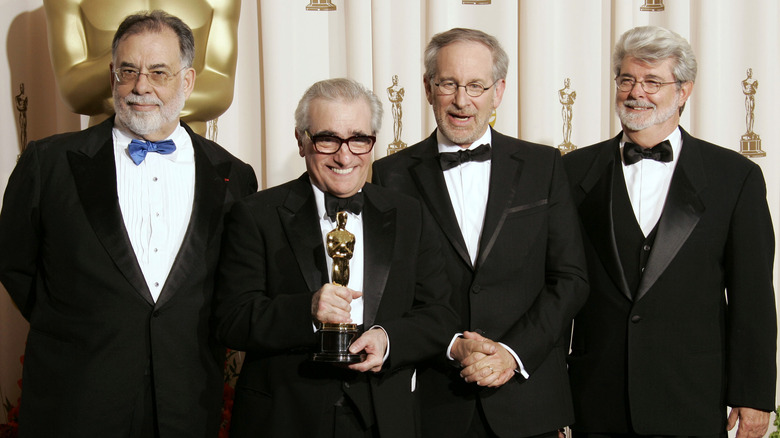Who Is The Highest-Grossing Director At The Worldwide Box Office?
The best filmmakers out there are those who can effortlessly combine their unique viewpoint of the world with audience pleasing entertainment. The select few directors who have achieved this have not only gone down in history as cinematic legends, but have seen big returns at the box office. But which director has managed to get the most butts in seats?
It should come as no surprise that Steven Spielberg remains the reigning king of the box office, with an accumulated global box office total of over $10 billion. Coming in close behind the famous filmmaker is "Avatar" and "Titanic" director James Cameron at $8.7 billion and "Avengers: Endgame" directors Anthony and Joe Russo at $6.8 billion.
Spielberg has helmed some of the most beloved and financially successful films of all time, with such hits as "Jaws," "E.T. the Extra-Terrestrial," and "Jurassic Park" even becoming the highest-grossing films of all time during their initial release. The latter dinosaur-starring epic remains the filmmaker's biggest money-making title to this day, having earned more than $1 billion over the course of its several releases. Also listed amongst his biggest hits are "Indiana Jones and the Kingdom of the Crystal Skull," "The Lost World: Jurassic Park," and "War of the Worlds." Even outside of the blockbuster realm, Spielberg's name has proven its viability with movies such as "Schindler's List" and "Saving Private Ryan" becoming profitable ventures.
There's no doubting Spielberg's expertise in attracting audiences. So it may come as a surprise that the three-time Oscar-winning box office champion holds a pessimistic viewpoint on the future of big studio tentpoles.
Spielberg may have predicted the trajectory of big budget movies over 30 years ago
It's no secret that Hollywood has had it rough as of late and even Spielberg isn't immune to the recent trend of box office woes. In particular, two of his latest efforts — 2021's "West Side Story" and 2022's "The Fabelmans" — failed financially despite critical acclaim. It may seem unthinkable to believe that such a cinematic titan would be struggling to reach an audience, but Spielberg himself seemed well aware that such a future was possible.
In a 1992 "60 Minutes" interview, the director was asked about his contribution to the escalating costs of film production. While Spielberg didn't believe he was at fault for how much studios decided to spend on their movies, he pinpointed his concern with what the uptick would mean for his style of filmmaking. "I mean the multiplication table of what films are going to cost 10 years from now is going to mean that Hollywood will be out of control in that they won't be able to give audiences grand entertainment anymore," he said. This sentiment has shown some merit, with high-priced blockbusters such as "The Flash" and "Indiana Jones and the Dial of Destiny" failing to attract audiences and losing their studios millions in the process.
However, Spielberg also believed that such returns could move the industry in a fresh direction, stating, "... you're just going to have to settle for films that are a little low in calories and there's nothing wrong with that too ... maybe it'll be a revolution, the films will be smaller but much more proactive." Time will tell how this thought holds up, but if there's any director who's box office opinions hold any weight, Spielberg is the man.

